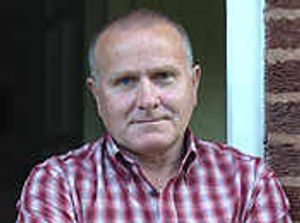How do firms know about our illnesses?
Michael Nock of Foley Road, Streetly, had a knee-replacement operation at Walsall's Manor Hospital. He went home to recover. What happened next came as a surprise.


"I suddenly got a brochure through the post from a company selling mobility scooters. At first I put it down to coincidence.
"But last year, six months after the first operation, I had the other knee done. I got home and a few days later another brochure about mobility scooters arrived. I thought, something's going on. It seemed to me that someone was passing on information about me and maybe making money by taking a backhander."
NHS staff are forbidden to pass patient information to private firms. Anyone breaking the rules can be sacked. A Black Country member of a regulating body says health-aid firms found to be using "moles" in hospitals will be expelled from the organisation.
And yet many Express & Star readers report similar experiences across the region.
Sue Prestwood of Longford Road, Cannock says: "Following an injury to her spine in January this year my elderly mother spent a total of two weeks in hospital, firstly Stafford Hospital and then Cannock Hospital. She sustained the injury in the confines of her own home.
"Last month she received a phone call from a company saying that they had reason to believe she had recently had an injury and did she want to claim for the injury? She didn't give any details and terminated the call. We kept this within the family. The only other people who knew were the hospitals and the ambulance crew."
Ivor Bevan, 63, of Castlecroft Road, Wolverhampton, is not due for treatment at New Cross Hospital until later this month. But within days of being booked in, he says, he had two suspicious phone calls.
"Someone said 'I believe you have had an accident in your home'. I said 'What?' and he said, 'Someone has had an accident in your house.' I told him to go away. It didn't twig at the time but obviously there is a mole in the system."
Artist Fred Barnfield, of Wednesbury tells a similar story:
"I had a prostate operation. Straight away, I was inundated with brochures from a company in Manchester offering some sort of pills to restore my sex life. They promised to do wonders for me. There must be moles in the hospitals, getting this information and selling it on."
A 73-year-old pensioner living in Stafford was diagnosed with prostate cancer in March 2005. He began a course of chemotherapy. "Within a week I got three mailings, all from firms in Ireland, all pushing treatments to keep my condition comfortable," he says. "I tackled my GP about it and he was most indignant. He said 'It didn't happen here'. "
He says: "I know this sort of thing goes on because I used to work for a hearing-aid company and my boss quite unashamedly sold our mailing list to other hearing-aid companies."
A Wednesfield man took his 68-year-old wife for an operation at New Cross Hospital, Wolverhampton.
"A few days later," he says, "I took a phone call from a man who said he believed a member of my household had had an accident. I explained it was a routine operation. He very quickly lost interest. He was obviously from a legal company looking for a compensation claim. It looks as though my wife's personal records had been passed to him."
A 78-year-old man in Wolverhampton had treatment for an eye problem. He says: "I am ex-directory and I never pass on my phone number, but obviously I had to give it at the surgery. I was immediately bombarded by calls from people trying to sell me double glazing and conservatories. It got so bad I had to put a call ban on it."
All the people who contacted the Express & Star believe their details and phone numbers were passed on to commercial companies.
The health-applicance industry has rules designed to prevent such intrusions. Mike Lord, chief executive of Minivator Group is a non-executive director of the British Healthcare Trades Association (BHTA). Minivator does not sell directly to the public and has not been named by any of our readers. Mr Lord says: "In an industry where so many of the customers are vulnerable, it is important to find companies that you know have an ethical approach. One way to find such organisations is to look for suppliers who are members of the BHTA."
Sharron Cutler, marketing manager at Minivator's Kingswinford base, says: "This is the first time I have heard of anything like this and it does not make the industry look good. It is contrary to the Data Protection Act."
She admits the industry has its darker corners. "We have heard cases of one company putting people outside another company's shop, handing out information as customers go in. That is obviously not ethical."
But she suggests that some phone calls and mail shots may have an innocent explanation: "For example, if someone buys a walking stick, it is possible that six months later they may require a walking frame and an approach may be made."
An NHS spokesman confirms that, while "anonymised" statistics are sold to private companies by the NHS, any passing of personal information without the patient's express permission is a breach of the Data Protection Act.
"There are rules to prevent this happening. It would be an internal disciplinary matter. If someone has been taking money for supplying information, it could be a police matter."





